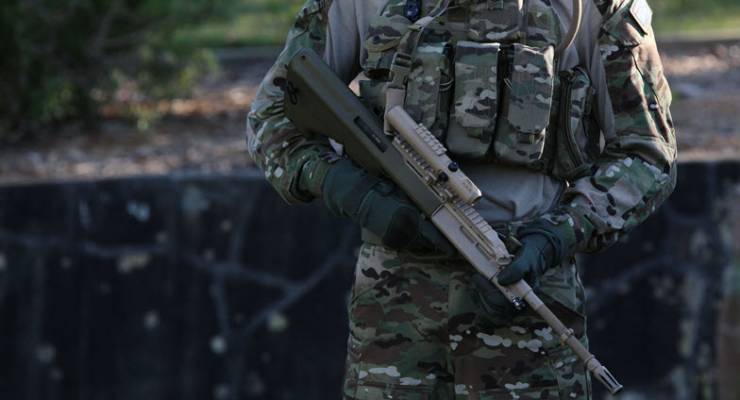
The fall of Afghanistan has thrown into disarray efforts to bring alleged Australian war criminals to justice.
As the country braces for a humanitarian crisis under the Taliban, any hope of securing witnesses for future criminal trials is quickly fading. The increasing control of the Taliban has long been flagged as a potential issue for investigators bringing alleged war criminals to court.
But with Kabul now fallen, the long-awaited criminal prosecutions of Australian special forces in Afghanistan may be in doubt.
Lives of witnesses at risk
It has been less than a year since the Brereton report revealed “credible evidence” Australian special forces were involved in the alleged murder of 39 Afghan civilians. The report recommended 19 soldiers be investigated for criminal prosecution.
Since then, the government has set up an Office of the Special Investigator (OSI) led by Justice Mark Weinberg to work alongside the Australian Federal Police to build briefs of evidence, including interviews with Afghan witnesses, in an effort to bring accused former SAS personnel and commandos operatives to criminal trial.
But Dr James Connor of the UNSW and the Australian Defence Force Academy says this work is now in jeopardy after the collapse of the Afghanistan government overnight.
“It would seem extremely unlikely that they could get any more interviews or appearances from people in Afghanistan currently,” he said.
“The lives of all these people are now at risk.”
There have been fears for some time that Afghanistan’s worsening security situation could hamper Australian efforts to investigate alleged war crimes.
Appearing at a Senate estimates hearing in May, OSI director-general Chris Moraitis said the Taliban’s resurgence in Afghanistan and the potential withdrawal of Western militaries presented a number of challenges for investigators. He also said a decision to close Australia’s embassy in Kabul was “not ideal” for the investigation.
“Clearly, having access to Afghanistan and witnesses in Afghanistan is important … the closure of the embassy would not be ideal, however, we have contingencies,” Moraitis said.
Impact on the Ben Roberts-Smith defamation trial
Another trial that may be impacted is the defamation case brought on by former SAS soldier Ben Roberts-Smith, who is suing The Age, The Sydney Morning Herald, and The Canberra Times over a series of reports that alleged he committed war crimes, including six allegations of murder.
The court has already heard the testimony of three key Afghan witnesses appearing on behalf of the newspapers, which were brought forward as the situation in Afghanistan worsened.
It is not known whether a fourth female witness, who was expected to corroborate the evidence of the other three witnesses, will now be able to provide testimony.
Enough evidence already?
Of course the AFP may have enough evidence for criminal prosecutions already.
Justice Paul Brereton travelled to Afghanistan as part of his inquiry to interview key witnesses. Without seeing the full evidence brief, it is hard to know whether more interviews and witness statements are needed for future prosecutions.
But what is certain is that any future court action will rely on the willingness of the Taliban to give Australia’s justice system access to crucial information inside its borders. That possibility, along with everything that has been fought for in Afghanistan for the past two decades, is fading fast.
“Without any ability to get that evidence and cross examine we have real problems,” Connor said. “It’s all up in the air.”








Was this the real reason we closed our embassy in May?
The reputation of one Australian VC winner is worth far more than the lives of a few hundred foreigners ‘ratty’
And the big showroom at the ministry of peace.
Australia.
International pariah.
But not for this. Realists the world over see that warfare is to make people die. Blame lies with the politicians who didn’t see fit to avoid the war in the first place. Korea? Vietnam? Iraq? Afghanistan? WTF!
Pariah for the CO2.
I am sure the Taliban will be more than happy to present a long list of witnesses – it’s in their interest to cooperate.
Maybe but given that the witnesses were, by implication, non supporters of the Taliban, it would hardly be in their interests to stick their heads up at this time.
I doubt that. They have bigger things to worry about than assisting a former invader investigate the crimes of their own military.
Nothing will happen about the war crimes issue. I’m over the ANZAC and RSL thingy. Considering the Afghan crimes there has been total silence. Then again what could you expect. Jimmy Molan is already sizing up our next war adventure, this time with China.
That won’t be an adventure, it will be a slaughter.
Simply because Afghanistan has fallen does not mean we should not pursue investigations into war crimes. The trials after WW2 would never have happened if that thinking had held. War crimes need to be investigated regardless. Although I wouldn’t be surprised by anything g these days.